These are the Dates I Choose to Remember
A brief overview of my annual observances, from Lenny Kravitz's dick to the Battle of Cable Street.

Like many of Discourse’s best blogs, this one started with an argument.
Actually, that’s not true. This one starts with a friendly reminder from me to Jack that next week marks the auspicious anniversary of one of my favorite dates, and the accompanying blog I wrote about it several years ago. THEN it became an argument:
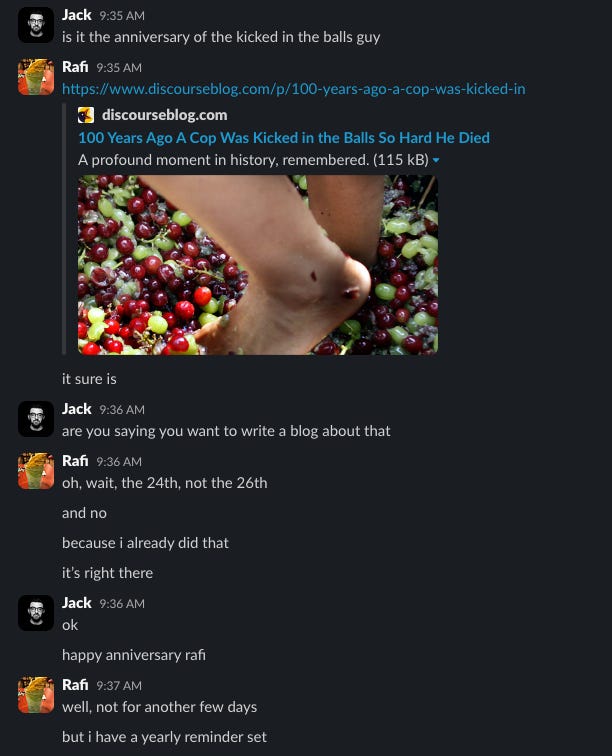
For those of you too lazy to squint, here is the full list:
Initially, I was skeptical that any of this was worth explaining. It all seemed pretty straightforward and easy to understand to me. Jack disagreed.
Guess how desperate I got?
Still, the more I thought about it, the more I realized that maybe my list of memorable days was worth unpacking. Why are these the dates I’ve chosen to remind myself of, year after year? What does it say about me as a person? What does it say about the world in which we live that these are things which not only happened, but which stand out as exceptional enough events to make idiots like me sit up and take notice? Probably nothing good. I honestly don’t know.
What I do know is that next week is the 102nd anniversary of New York City Police Department Patrolman William Deans getting kicked in the balls so hard he died, and then two months after that is the anniversary of rocker Lenny Kravitz covering The Guess Who’s “American Woman” in Stockholm and doing a lunge so deep in his leather pants that they split open and his schmeckle went *flop* in front of god and twitter and a whole bunch of Swedish people. If that’s not worth commemorating, I don’t know what is.
Here are the other dates I’ve chosen to memorialize in annual chronological order. Mark your calendars accordingly:
Burns Night: January 25.
Probably the most normie of the bunch, Burns Night is the annual international celebration of iconic Scottish poet Robert Burns. To mark the occasion, people get together, read some poetry, drink some whiskey, recite an ode to, stab, and then eat a haggis, and other normal Scottish things. It’s lovely.
Helene Adelaide Shelby receives patent for “fake skeleton to scare criminals into confessing” machine: March 4.
This is exactly what it sounds like. On March 4, 1930, Helene Adelaide Shelby was granted a United States patent for her “apparatus for obtaining criminal confessions and photographically recording them.” The device, which as far as I can tell was never actually put to use by any law enforcement agency, was essentially two small, dark closets attached to one another. In one, the person being questioned stands uncomfortably as “a figure in the form of a skeleton” complete with red glowing light-bulbs for eyes stands across from them looking scary as hell (I guess?) while an unseen human interrogator shouts questions through a megaphone until the suspect confesses to whatever crime they’ve been hauled in for. It looked like this:
Imagine an alternate history in which “good cop/bad cop” techniques were never introduced as a police tactic, and people got yelled at by a bunch of Halloween decorations instead. I’m not saying it’d be a better world, but it’d be a whole lot more interesting, at least.
Battle of Blythe Road (Aleister Crowley kicked down stairs): April 19.
Dubbed “the wickedest man in the world,” British occultist, explorer, libertine, and general weirdo Aleister Crowley was a man of many talents, including the alleged practice of spooky scary black “magick.” That was a problem for the other magical members of England’s Hermetic Order of the Golden Dawn, a group of spiritualists that included author Bram Stoker, and poet William Butler Yeats, who refused to let Crowley into the Order’s inner circle. Not one to take kindly to rejection, Crowley did some spellcasting about it, and then—per Yeats biographer Richard Ellman—showed up at the Order’s London headquarters on Blythe Road:
Equipped accordingly in Highlander’s tartan, with a black Crusader’s cross on his breast, with a dirk at his side and a skindoo at his knee, Crowley arrived at the Golden Dawn temple in London. Making the sign of the pentacle inverted and shouting menaces at the adepts, Crowley climbed the stairs. But Yeats and two other white magicians came resolutely forward to meet him, ready to protect the holy place at any cost. When Crowley came within range the forces of good struck out with their feet and kicked him downstairs.
This is perhaps the single most important magical duel in modern history.
Anniversary of patrolman William Deans getting kicked in the balls and dying: June 24
Just read the blog, okay?
Lenny Kravitz’s Dick: August 3.
Like I told Jack, this one’s pretty self-explanatory.
Battle of Cable Street: October 4
Despite what right-wing demagogues and liberal status quo lovers would have you believe is a new and unacceptable trend of street-level anti-fascist action, there is a long and well-documented history of ordinary people not only turning out en masse to reject the Nazis in their midst, but doing so with their fists, feet, and chamber pots. In 1936, as racist authoritarianism was on the rise across Europe, tens of thousands of Jews, communists, trade unionists, and other ordinary Londoners blocked streets and battled police who had been dispatched to protect a march organized by Oswald Mosley’s British Union of Fascists. After hours of hand-to-hand combat across East London led to dozens of arrests and injuries, the BUF march ended, as did the group’s ascendency in British politics at large. It turns out that punching Nazis gets results, after all.
Anniversary of mass Charlie Chaplin hysteria: November 12.
Imagine if one day, completely out of the blue, almost a thousand people across the entire country suddenly insisted that they had seen with their own two eyes Tom Cruise just hanging out in their respective cities and towns, all at the same time.
That’s more or less what happened in mid-November 1916, when the Boston Society for Psychical Research announced it was investigating “certain phenomena connected with the simultaneous paging of Mr. Charles Chaplin, motion picture comedian, in more than 800 large hotels of the United States.” There was even a name for the phenomenon: “Chaplin-itis.” While it seems unlikely that Chaplin, perhaps the most famous man on earth at the time, really was appearing in hundreds of hotels across America all at once, I, personally, refuse to reject the possibility out of hand.
Repeal Day: December 5.
Didn’t you learn about this in high school civics class? Used to be you couldn’t legally drink booze in this country. Then, on December 5, 1933, prohibition was repealed and suddenly you could. Cheers!
David Yow clocked with a beer bottle during “Seasick”: December 12.
One of my great regrets is never getting to see The Jesus Lizard in their prime. If there’s such a thing as the spiritual heir to someone who is, themself, still alive, then there’s a strong case to be made that frontman David Yow is as close to Iggy Pop as Gen X will ever get. For proof positive, look no further than this grainy footage of Yow getting absolutely brained in the noggin by an errant beer bottle in the middle of a gig in Dallas. Yes he goes down hard, but then he gets back up, and finishes the set anyway. Is this inspirational? No. I don’t want to get smashed in the head by flying glass. But it’s pretty cool to watch. And I do, every year on December 12.
Well, that’s my list of important anniversaries. I don’t know if there’s any sort of overarching “theme” or big lesson to take from all this. Sometimes it’s just nice to have a fun date to look forward to, I guess.





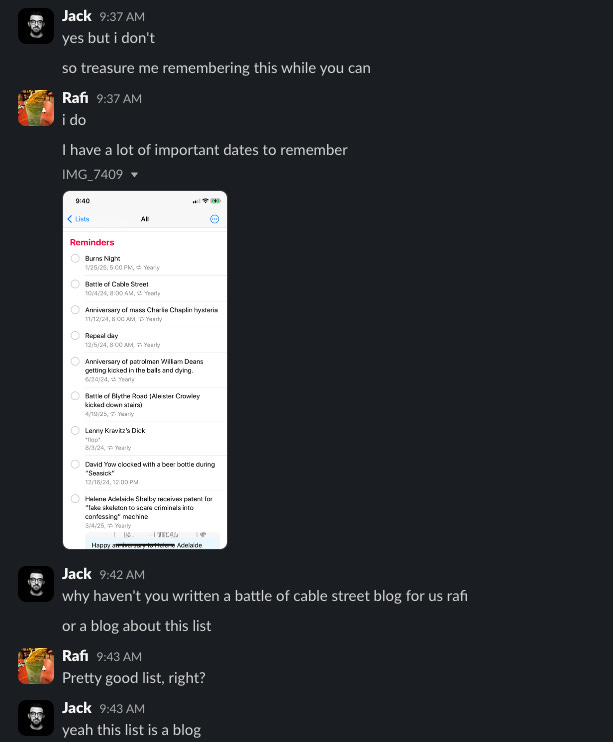
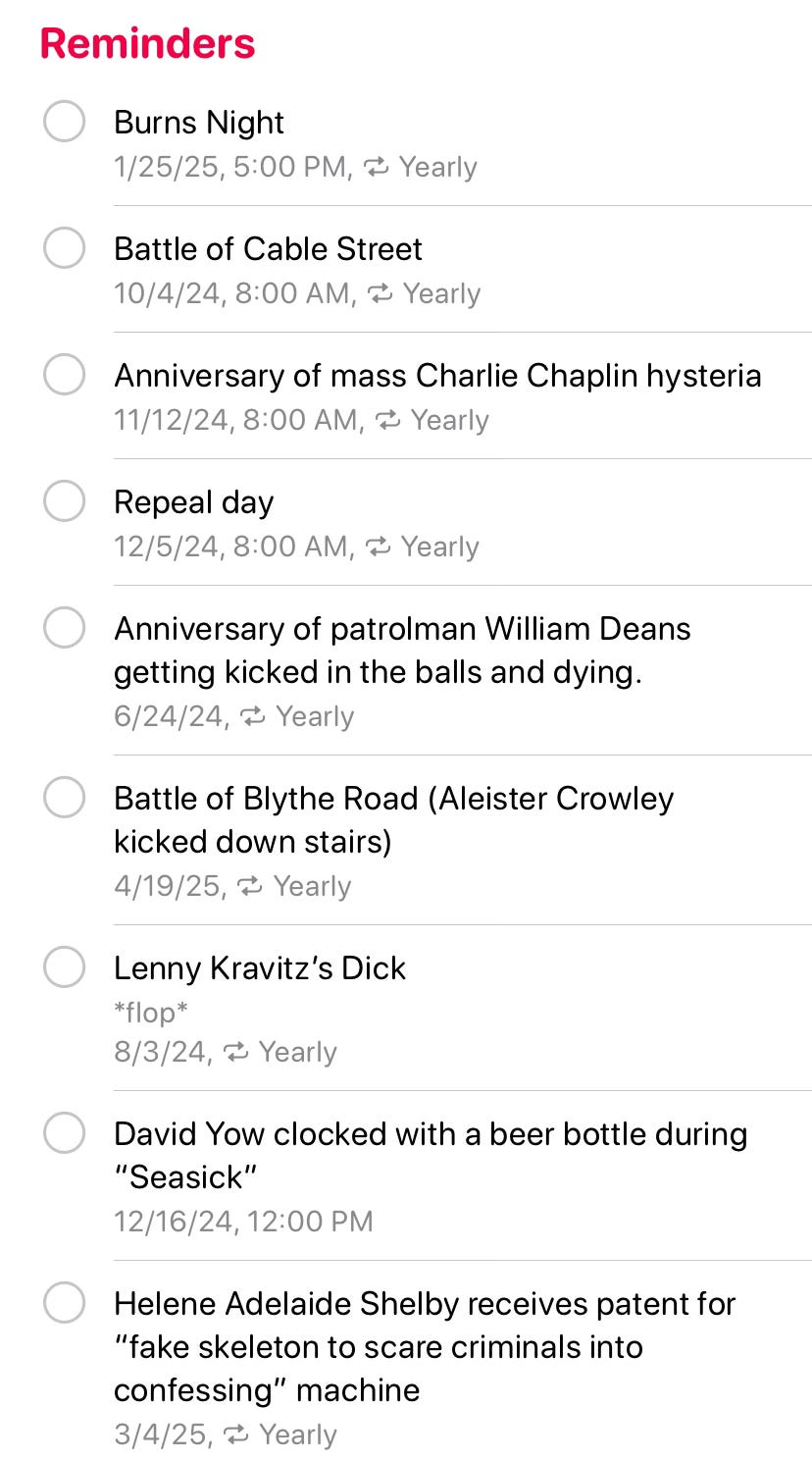
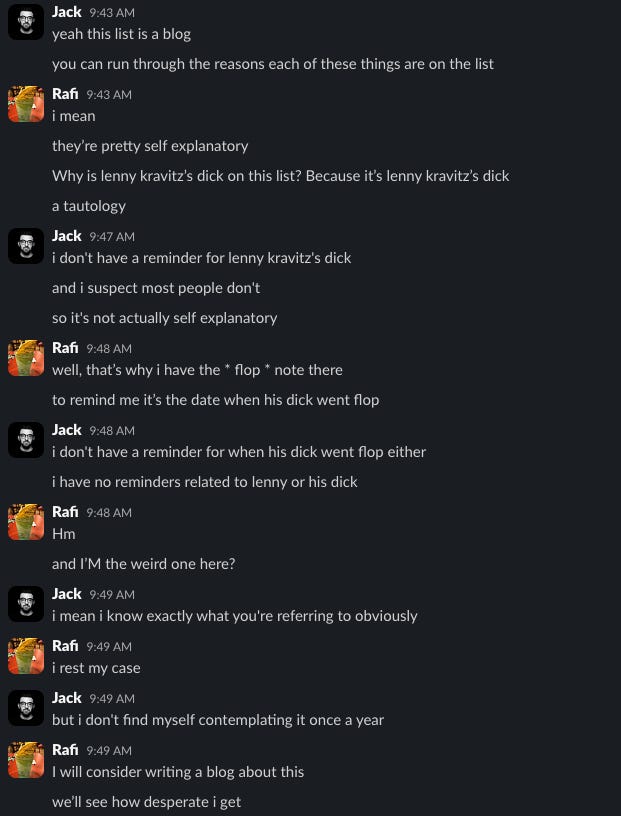
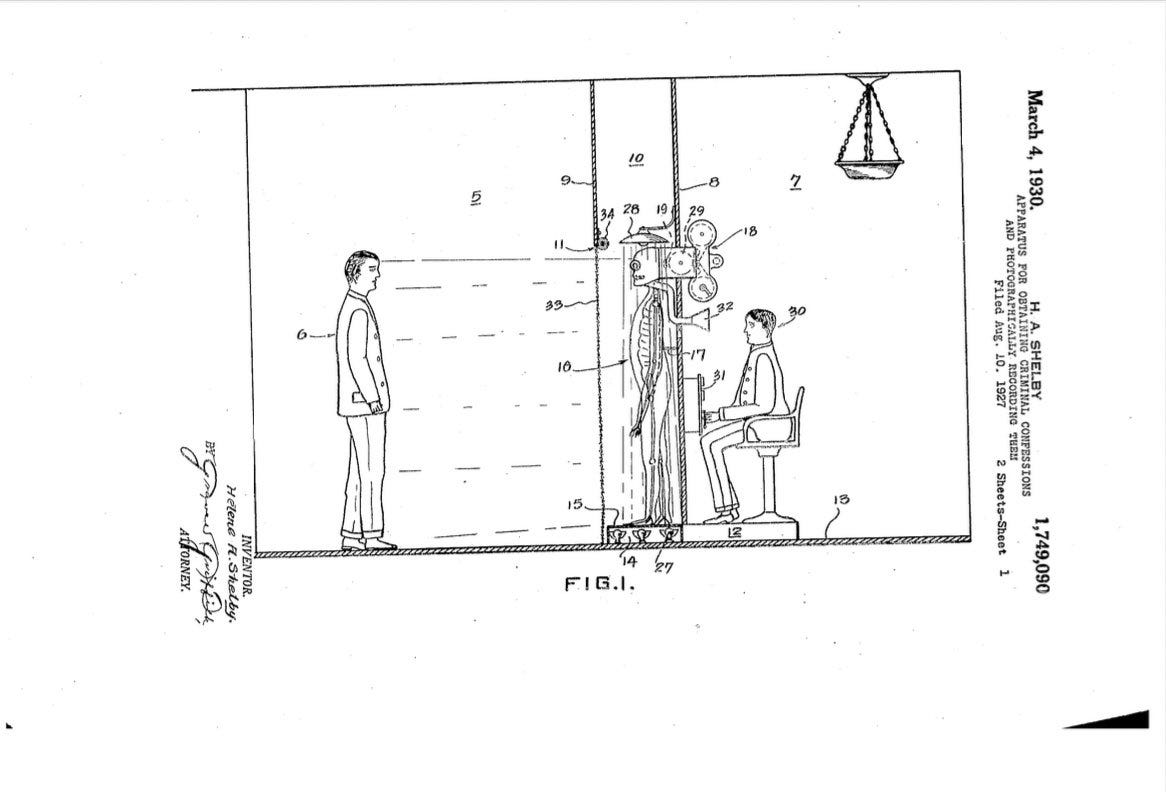

I saw David Yow with Scratch Acid, his band before Jesus Lizard, back in the days when he routinely shat himself onstage and kept performing. I was always a prude when it came to scatological expression, so I got as far away from the front as I could but still worried that some errant diarrhea might splash on me somehow. As you may have inferred, I'm rather elderly.
Glad you described the entries, Rafi. I thought "Burns Night" was when Montgomery Burns was shot.